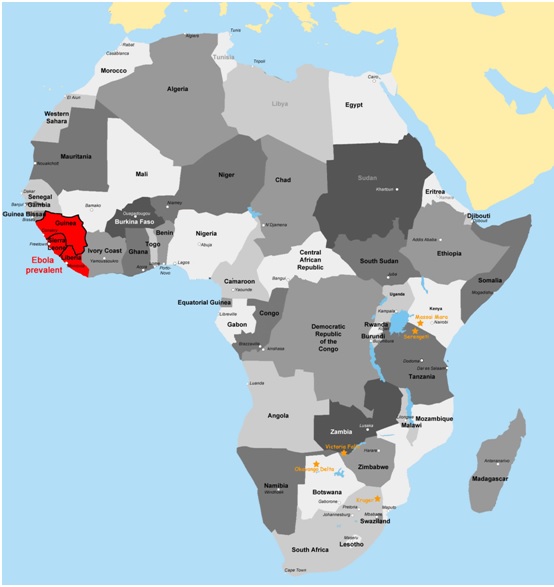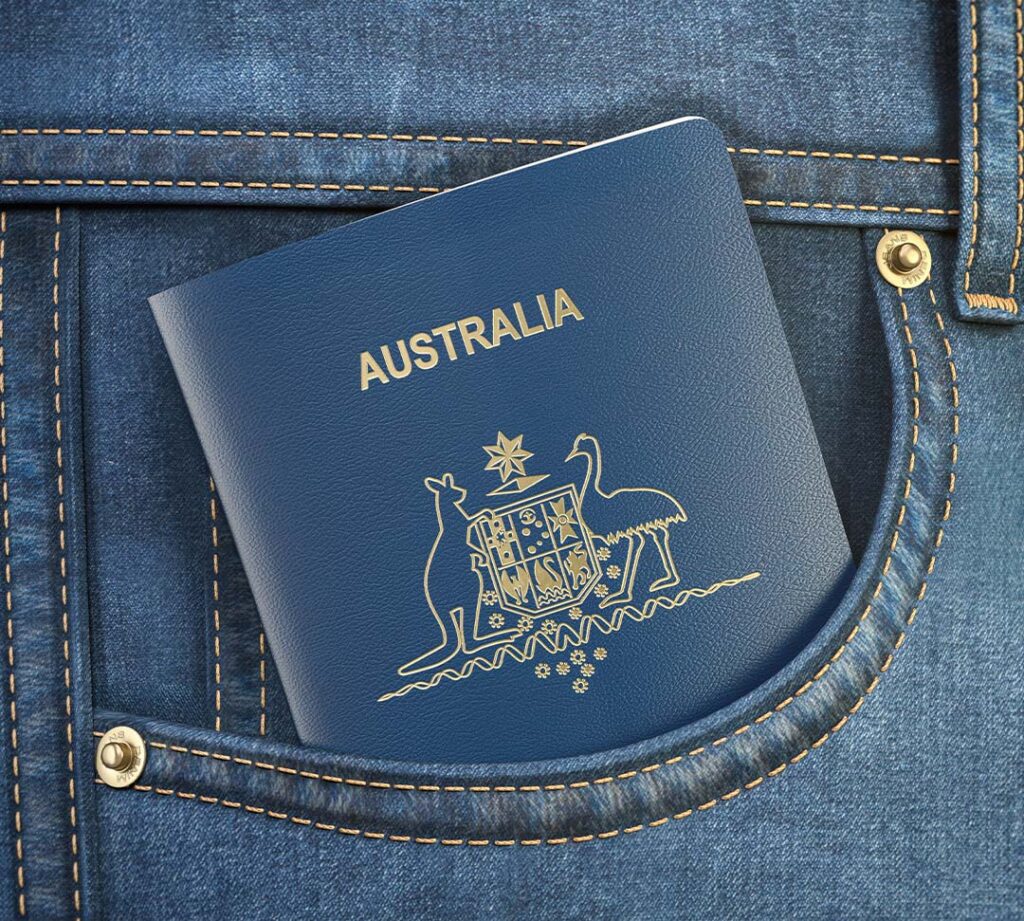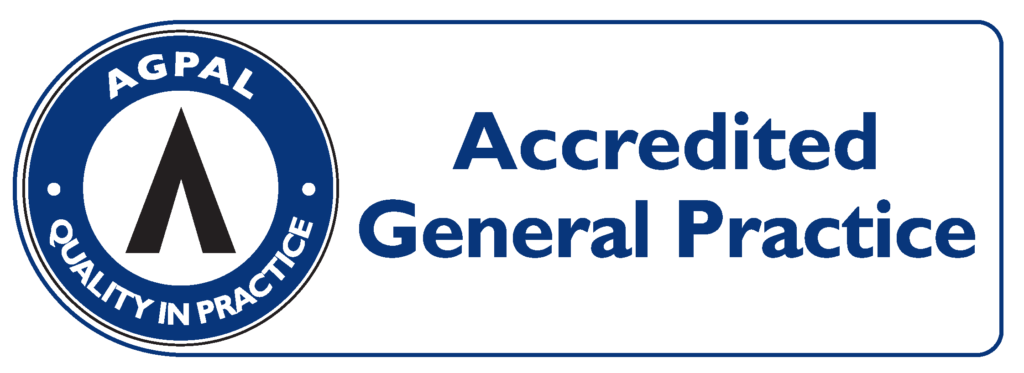Africa
Travelling Africa
Africa is growing in popularity as a tourist destination. In Central and Southern Africa however, there are significant disease and health concerns for the traveller.
It is wise to check the Australian Government website, www.smartraveller.gov.au , for up to date advice on your destination before leaving, and register your travel plans. The website www.cdc.gov/travel , also has excellent comprehensive travel advice. This site also gives current advice on the Ebola Virus outbreak in West Africa, and travel information for affected countries.
Health risks can be reduced in Africa by vaccination, taking preventative medications and being aware of activities that can increase risk of injury.
Vaccine preventable illnesses
Yellow Fever:
This mosquito-transmitted viral hemorrhagic infection is endemic through sub-Saharan Africa, and the highest risk months are July to October. Vaccination is mandatory for entry to many African countries. Even if you are transiting through affected countries you may still require Yellow Fever vaccination.
Hepatitis A and B:
Infectious (A) and serum Hepatitis (B) vaccination is recommended to all travellers.
Polio:
Polio is still occurring in many African countries. Adult Polio booster is recommended if it has been more than 10 years since last vaccination, and children should have up to date routine vaccinations in which Polio is included.
Cholera:
Oral cholera vaccine is usually only recommended to travellers who will be working in the health care industry or aid workers. There is some cross-protection from the Cholera vaccine for traveller’s diarrhea, which may help patients such as those with poor immune function.
Tetanus, Diphtheria, Influenza, Measles/Mumps/Rubella and Pneumococcal vaccines may need to be updated in some travellers.
Meningococcal meningitis:
Meningococcal infection is prevalent in Sub Sahel Africa – called the meningitis belt, countries adjacent to the Sahara Desert. Transmission rates are highest December to June. Pilgrims attending the Hajj or Uhmra require mandatory vaccination.
Typhoid:
Or enteric fever is 70 % protected by single-dose vaccination. It is recommended for travel throughout Africa.
Rabies:
Rabies is a fatal neurological disease transmitted by a bite from an infected animal. Rabies is recommended to some travellers who are at increased risk of an animal bite. This includes those spending time in rural communities, aid and ex-pat workers, vets and animal workers. Small children are at increased risk. Rabies pre-exposure vaccine consists of 3 doses of vaccine over 1 month. If bitten by a suspected rabid animal while away a further 2 doses are given after the bite.
Other illnesses
Malaria:
All countries in south and central Africa have malaria risk in at least part of the country. The highest risk of infection is in those countries in sub-Saharan Africa. Malaria prophylaxis is recommended for most travellers unless travel is limited to the larger cities such as Johannesburg or localized travel to malaria unaffected areas. If travelling to remote areas, with poor access to medical help, standby treatment for malaria may be prescribed.
Bite prevention:
Is important at night, COVER-UP — long sleeves, long pants, covered footwear—, SCREEN UP — with insect repellant—, and SLEEP PROTECTED, —bed nets / air-conditioned or screened rooms.
Traveller’s diarrhea
This is common in the first 2 weeks of travel and can be treated with antibiotics and an antidiarrheal medication if the infection will cause inconvenience while travelling, or is a risk due to pre-existing medical conditions.
Other insect-transmitted infections:
There are many other insect-transmitted illness in Africa – prevention for this illness is restricted to preventing bites.
Dengue fever:
A viral infection transmitted by mosquitoes, which bite in the day, and breed in stagnant water in built-up and urban areas. USE INSECT REPELLANT, and check accommodation for mosquitoes before settling in.
Chickungunya:
A viral illness causing fever and severe joint pain. It is transmitted by the same mosquitoes that cause Dengue Fever. The disease is found in central and southern Africa and Madagascar.
African Tick Fever:
Is transmitted by a tick bite. Tourists on safari or trekking are at greatest risk, protective clothing helps.
African Trypanosomiasis:
“sleeping sickness “ is transmitted by the daytime biting tsetse fly.
Water and soil related infections
Schistosomaisis:
Is caused by the larva of blood flukes penetrating the skin while immersed in freshwater. Swimming or watersports increase risk of infection. Travellers should not swim or immerse in freshwater lakes such as Lake Malawi or Lake Victoria or the Omo River in Ethiopia. Leptospirosis is another febrile illness contracted from freshwater exposure.
Walking barefoot should be avoided as this increases the risk of hookworm and other helminthic (parasitic worm) infections. Avoid eating vegetables that may be contaminated with soil in rural areas.
Other risks specific to Africa
Mt Kilimanjaro:
The summit is 5685m (18, 652’), and at this altitude, most climbers will get altitude sickness. Preventative medications and appropriate acclimatization may decrease risk.
Injury from road traffic accidents is common due to poor road conditions, imperfect vehicles, and lack of road rules and policing. . Be aware, ware seatbelts, and don’t travel if you feel unsafe.
Medical support
www.worldhospitalsearch.org lists JCI accredited hospitals.
In Central Africa, The Aga Khan University Hospital is located in Nairobi, Kenya.
Phone +254 20 366 2000. www.hospitals.aku.edu/nairobi
There are many excellent hospitals in South Africa, in Cape Town, Durban and Johannesburg. The Australian Embassy in Pretoria can give advice on location. www.southafrica.embassy.gov.au
SOS International – provide medical support services, their Assistance center is located in Johannesburg South Africa, with clinics located in Nigeria, Ghana, Chad and Angola. See www.internationalsos.com for more information.
Australian Embassies and High Commissions in Africa
For all consular emergencies contact +61 2 6261 3305 (24 hrs.)
Other information can be obtained at www.dfat.gov.au
Australian embassies and high commissions are located in the following countries:
- Ethiopia, Addis Ababa. Phone +251 11 667 2678
www.ethiopia.embassy.gov.au - Ghana, Accra. Phone +(233 302) 2164000
www.ghana.embassy.gov.au - Kenya, Nairobi. Phone +(254 20) 427 7100
www.nairobi.embassy.gov.au - Nigeria, Abuja. Phone +234(0) 94612780
www.nigeria.embassy.gov.au - South Africa, Pretoria. Phone +27 12423600
www.southafrica.embassy.gov.au - Zimbabwe, Harare. Phone +263 4 853 23555
www.zimbabwe.embassy.gov.au - South Africa, Pretoria. Phone +27 12423600
www.southafrica.embassy.gov.au




